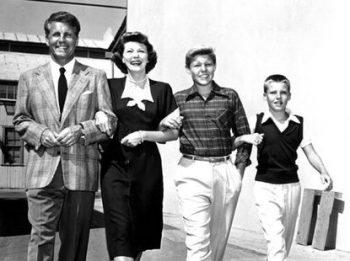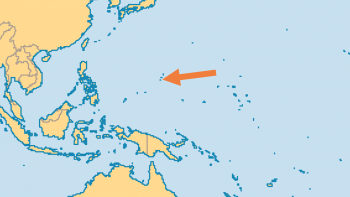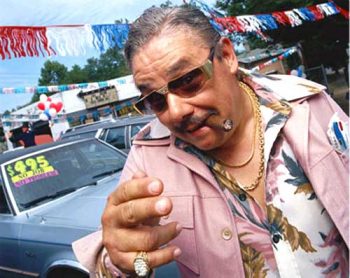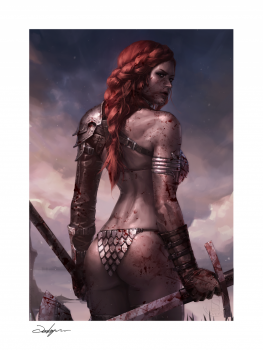Treading Carefully
As soon as the bag was swept off of my head, I knew that I hadn’t been taken to Black Gate‘s legal department for a refresher in corporate espionage. Rather, I was in a clean, well-lit room, circular in shape and towering in height. Wide windows let in shafts of morning light, filtered through the vines and flowers that hung in streamers from planters at intervals, and trellises rising up the walls. I hadn’t suspected a place like this existed outside of the Editorial Spa, and found it to be a pleasant surprise.
The man who had removed my hood, however, shoved me backward as I got my bearings, and I fell unceremoniously into a massive beanbag just behind me. As I struggled to sit upright once more, a woman took a position across from me before a plush divan, and while her dusky Mediterranean skin contrasted with the sharp white of her suit, her cool gaze contrasted with literally every other emotional cue in the room. She sat.
“You’re not with Black Gate, are you?” I ventured.
“No, Mr. Starr. I’m with the Office of Regionally Generated Attitudes.”

“Am I in some sort of trouble?” I was suddenly a lot less comfortable sprawled out in the beanbag, but all efforts to sit straight and match her bearing failed. I slumped back.
“Oh, no. Not yet. We are simply here to review the situation, before it gets out of hand.”
“The… situation?”
“Your current project. It’s a diversity issue, you see.”
“Well, you don’t have to worry about that,” I said, feeling a wave of relief. “I’ve got people from all over the world in this book.”
“Yes,” she said, motioning to someone out of sight behind me. A pair of men stepped forward, bearing between them not just my writing desk, but everything upon it, including not just my typewriter, but the neatly stacked pages of my manuscript’s first draft. This stack shifted alarmingly as they dropped the desk before the woman, who took up the topmost sheet off the pile and gazed at it.
“Let’s see,” she continued. “You have a man whose family is from the Bikini Atoll, an Inuit woman, and a Chamorro priest?”
“A Catholic priest, actually,” I corrected. “But he’s Chamorro, yes.”

“Tell me,” the woman said, leaning forward the slightest bit, and making me more aware of how much lower I was sitting, “are you Chamorro?”
“Well, no,” I admitted. “But the culture of Guam is-”
“-not something you’ve seen first hand?” she finished. I hesitated.
“Uh… should I have a lawyer present, or something?”
Her gaze hardened as a man I hadn’t noticed before stepped around from behind me, bending to me and offering his hand. I shook it, taking in the dark orange suit, the wide sideburns, and a rather intrusive tuft of hair peeking through the thick gold chain visible past open buttons.
“It’s okay, sport, I got you covered,” he told me, reversing a nearby chair and sitting on it, leaning forward, legs wide, shoes shiny. A wave of aftershave accompanied the motion. He fixed the woman with a wide grin and I saw his gaze glide up and down her slim form. “We didn’t mean to hurt your feelings, little lady. Did we, Starr?”

I struggled more upright, feeling the beans shift within the bag. “No! I mean, who are you? Are you a lawyer?”
“Cripes, no!” he answered, “I’m your representative from the Order of Patriarchal Recidivism.”
“I’m not a member of that!” I protested, as much to the woman across from me as to the man beside me. “He doesn’t speak for me!” I assured her. But the man waved my words away.
“You don’t have to play defense any more, Starr!” he assured me. He leaned forward against the back of the chair and pointed at the woman with this pinky. “Now hear me out, sweet cheeks. My client is asserting his right to speak for any culture on this planet or any other.”
“I am not!” I gasped, feeling a nervous giggle arise within me. Forcing it back, I struggled to continue, holding her gaze imploringly. “I mean, surely you’re not saying that the all-white, all-male casts so common in early science fiction and fantasy is now mandatory!”
“Of course not!” she snapped. “Just the opposite!”
“So why can’t I have an Inuit character?”
“Are you familiar with Inuit culture?” she asked me.
“Not intimately,” I answered. “But surely research counts for something?”
“Yeah, doll,” me representative seconded. “How hard can Inuit culture be? What, you’ve got igloos and some seals and stuff, amiright?”
“Whoa!” I said. “I didn’t write that!”
“Well,” she responded, “what you did write, however well-intentioned, is almost certain to come off as condescending and simplistic to the people in question.” My representative snorted dismissively at this, rolling his eyes silently as she continued. “Many of these cultures rightly feel misrepresented, and might see this as cultural appropriation.”
“I can appreciate that,” I said carefully, as my representative shook his head in open disbelief at her words. “I do try to find a way to have people of the cultures I write about review a later draft, to clear up the biggest mistakes. But I’m also writing in a world that isn’t exactly ours, so there are bound to be cultural differences anyway, right?” Her look was dubious, but she cut off her own retort and listened as I continued.
“Even a fantasy story in the most stereotypical medieval European setting is usually full of inaccuracies. Ask any historian. And even they don’t fully agree on lots of specifics. So it’s not just vastly different cultures from around the world that writers get wrong. It’s the roots of their own culture, as well. I’m going to bet that writers all over the world do the same thing. We’re writing fantasy and science fiction here, not historical textbooks.”
“Yeah, babe,” my representative added. “What about all that chainmail bikini armor that he’s got in his stories?” He chuckled.
Horrified, I shook my head. “I don’t have any-”

Her words paved over my own effortlessly as she responded. “But surely you can see that members of these cultures will want to tell their own stories? They don’t need someone from outside, who has only a vague idea of how to navigate in their world, making maps for others to follow. Surely you can understand that?”
“Of course,” I answered.
“Nope,” said my representative.
“But here’s my problem,” I concluded. “I can’t just write stories featuring just white guys all the time, just because I happen to be one. I wouldn’t want to read that, and so I sure don’t want to write it. So, respectfully, I’m just going to have to try my best to write the non-white and non-male characters, and keep in mind how sensitive an issue this can be.”
She sighed, glancing at a slim watch and standing. “I suppose we’ll suspend action at this time,” she said. Turning to go, she locked me in place me with a final narrow-eyed appraisal. “But remember, tread carefully.”
“No problem, Legs,” my representative drawled as she walked away, and I was about to admonish him when we both stopped to stare at the pink dark protruding from his neck. As he gasped in surprise and dropped unconscious, I felt a sudden sting in my shoulder, heard a muted whoosh of compressed air from somewhere behind the nearest flower trellis. I fell back at once into a lethargic haze, feeling a sense of relief as hands lifted me from the beanbag. It was good to know that people were keeping an eye on me, and knowing that, for all the handcuffs, blackjacks, and pepper spray employed, they were actually on my side.
i have no experience writing anything for but fun, but i imagine just like when creating RPG worlds or a campaign, creating things not like you can all end up defined by stereotypes and not enough research. the research has to be cared for, not just done so you can pass some test. but i also know you will never please everyone, so working towards a way to create interesting stories in interesting cultures with interesting characters can seem more of a chore then it needs to be, but the passion in writing itself must lend a small bt of that passion to research and understanding of “people” and situations themselves.
i feel like the better writers, in my view often lean towards an understanding of motive and people not exact but close to a psychologist. i would think to write about people is to study them, and through that i think anyone can write anything. continually challenging yourself to give a shit about difference and stereotype is maybe a skill more people need, and this reminds me of that.
great article, thank you Mr. Starr
I woke, tied to a chair in a log cabin. Through the half-open door I could just the rising sun gilding steep, pine-covered slopes.
The creak of a floor-board alerted me to the fact that I wasn’t alone. A man walked into my line-of-vision, folded his arms and stared down at me disapprovingly. His clothes looked both slightly old-fashioned but also as if he’d bought them in a camping shop. The eyes behind the glasses were full of mild disappointment. His most distinctive feature was his feathery moustache – something I’d last seen sported by working-class Dubliners back in the Eighties.
Another floorboard creaked as he was joined by a second man who might have been his twin.
Well, apart from how this character was blond while the first man was auburn. Then there was the height difference…..I guess the only common denominator was that they both had moustaches?
Even as the second man stuck his hands in his jean pockets, shook his head and pursed his lips, a third man in a lumberjack shirt loomed into view through the open door, a dead stag thrown across his broad shoulders. He was younger than the other two – or maybe only looked younger because he didn’t sport a moustache. He grinned broadly as he slung the beast down onto the table.
‘So is this the guy?’
‘Yup,’ the first man said mournfully. ‘We’re a teeny bit disappointed, Fitzgerald.’
‘It’s your books,’ amplified the second, holding up a battered paperback for me to inspect.
‘Lucas Smith and Bigfoot.’
I’d written half a dozen books in that series. Lucas Smith was a nice kid who lived on the outskirts of some anonymous Canadian town, liked ice-hockey and RPG and who got into all sort of supernatural-type scrapes. I’d populated the town with characters inspired by the cast of ‘The Beachcombers’ and based Lucas’s dad on Ned Flanders.
OK, so maybe I’d taken one or two other liberties. What else could I do? I mean, I’d never even been in Canada.
‘Flanders isn’t even Canadian,’ the auburn-haired man snapped, as if reading my mind.
‘Yeah, I know,’ I admitted, staring down at the floor.
‘Bigfoot is American,’ the blond man said gently. ‘American, Fitzgerald! Up here we have Sasquatch, not Bigfoot -’
‘Bigfeet?’ suggested the guy with the deer.
‘We have Sasquatch?’ asked the blond man. ‘I mean, seriously? Do we?’
‘Of course not!’ snapped the auburn-haired man.
‘What about Wendigos?’
Wrong question. All three heads turned in my direction, then slowly shook in unison, their quiet disapproval only too obvious.
It was going to be a long day
LOL!
If this was meant as a blogger application, you got the job. 🙂
Weirdly enough, re-reading reminds me of an old job interview….
‘The Beachcombers’ ran for years on Irish TV.
[…] JOCULARITY. Aaron Starr is “Treading Carefully” at Black Gate. So is this supposed to be an example of a successful or unsuccessful lighthearted […]